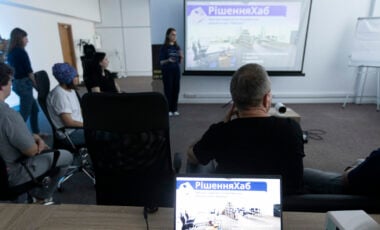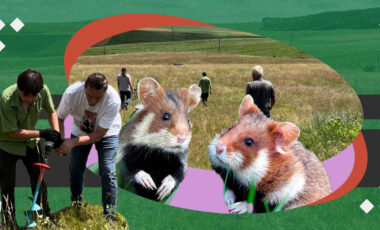Vegetables from the school garden: how students in Donetsk region created their own agricultural complex
...and how the school makes money from such eco-project

On September 1, not only schooling begins, but also school life for thousands of students across the country. Learning doesn't have to be boring; besides, if you approach it creatively, it can be a source of new initiatives for students. The ecological trend is gaining more and more momentum in the world, and it is quite possible to make it an organic part of the educational process while at the same time instilling responsibility and even entrepreneurial traits in students.
Agricultural complex in the schoolyard
So, two years ago, the teachers of the school in Novomykolaivka, Sloviansk district, Donetsk region, decided to create a modern mini-agricultural complex. It would allow to instill in students a love of agriculture, introduce them to its basics, and provide an opportunity for high school students to conduct scientific research and even earn money.
Agrohub "Parostok" was started by mathematics and physics teacher Daria Bohdanova, head of the public organization "Society of Active People." The project team collected money on the "GoF" platform to purchase everything necessary. It was necessary to collect 25 thousand hryvnias, then representatives of the platform would give the same amount. That much money was needed to provide the project with everything it needed and give it a solid start before it started to support itself.
"We were lucky," says Daria Bohdanova, "a sponsor, a US citizen, provided us with more than the required amount. A year before, I was at a volunteer camp where I met a group of Americans. One of their acquaintances saw our publications on the Internet about collecting money for the project and sent these funds. So, we even managed to buy more equipment than we planned."
By the way, collecting these funds without grants and sponsors is possible – we will talk about this a little later.
The newly created AgroHub "Parostok" was set up in 2 greenhouses and a school workshop. In addition to greenhouses, soil, trays, LED lamps, seeds, garden tools, as well as microscopes, and a composter were purchased.
And it all started with the fact that the students of the Novomykolaiv School of the Cherkasy OTG, under the guidance of biology and craft teachers, sowed a small area in the schoolyard with useful greens. The children took care of parsley and dill together, watered them, and fought with weeds. They were thrilled when the plants started to grow. And they rejoiced even more, when the greens harvest was transferred to the school canteen, where everyone could try it during the school lunch.
Now schoolchildren grow not only greens for salads. Sweet peppers, cabbage, tomatoes, cucumbers, and eggplants grow in greenhouses. Vegetables go to the school canteen. Last year, there were so many tomatoes that the leftovers were even sold to those who wanted them. But the main income of young agronomists comes from selling seedlings – vegetables and flowers.
Beautiful and useful
The Agrohub "Parostok" project is seasonal. In October, seeds are planted in trays located in the school workshop. Plants are helped to develop properly by special lamps for plants. By New year, you can collect greens, onions, and cucumbers. Then seedlings (flowers, peppers, tomatoes, cabbage) are grown here, then planted in a greenhouse at the end of March, and sold at local fairs. There is a composter near the greenhouses, where fallen leaves and organic waste are disposed of, so fertilizers for plants are also from our own production.
"All our students are involved," says the teacher, "the younger ones water and learn to plant out; the older ones monitor the microclimate in the winter and work in the greenhouses in the spring." And the biology and chemistry lessons have become much more interesting; now they are not only books with pictures but real research: children study the composition of soils and observe the growth of cells under a microscope. It is very interesting for children to work with plants; they happily wait for the moment when we have to plant seeds, plant out seedlings, and transplant them." Also, students, graduates of this school, often come to help during the holidays.
Within a year, the project was completely self-financing. "At various charity fairs, we sell our products to fellow villagers and residents of surrounding villages. All funds are spent by the children at their own discretion – for rest, for the development of our project," Daria shares.
In 2 years, they earned about 10,000 hryvnias, but they did not set the goal of making money. The main motivation is to give new knowledge, teach children an ecological attitude to the environment, and be proud of their work.
Part of the money from selling plants goes to social events — to help large families and a family-type house in Sloviansk. The children also participated in the campaign "Collect a basket for the ATO" – in addition to souvenirs and self-grown vegetables, the basket also contained goodies that the children also prepared for the soldiers.
At the beginning of summer, project participants, the village head, and residents planted flowers in three village flowerbeds. "Even before the quarantine, our students managed to grow about 1,000 seedlings of petunias, salvia, and marigolds," the project organizer is proud, "some of which we gave to the village." Children are happy to see the smiles of fellow villagers, to hear words of thanks."
Colleagues from other community schools are interested in the experience of the Novomykolaiv school agrohub, but none of them has started something similar.
How to organize such a project without a sponsor?
But it is possible to organize a school mini-agro-complex without the participation of foreign sponsors. Agricultural enterprises, farmers, and territorial communities could join the project. For example, a local farmer actively helps "Parostok," bringing high-quality soil for the greenhouse and providing a truck if necessary. In the village of Vesely in Zaporizhzhia, a similar project is being successfully implemented, the funds for which were allocated by the OTG, and the students of Shtunska primary school of I-III grades are growing a real mini-garden on the windowsill in the classroom. For their experiment, they chose cherry tomatoes.
According to Daria Bohdanova, the biggest problem with implementing such a project is that a lot of personal time is spent on its preparation, implementation, and development, and not everyone will agree to this. Therefore, a team of result-oriented enthusiasts cannot be dispensed with either.
Meanwhile, the school agrohub in Novomykolaivka is developing and regularly reports on its achievements on its Instagram page. This year, 70 gooseberry and currant bushes were purchased with the money earned. The goal of the organizers is to create a social enterprise.
"We want everything to be official," says Darya Bohdanova, "it will be a non-profit form of entrepreneurship. There will be certain documentation and no cash, but there will be an account to which funds will be deposited. This will make it possible to grow seedlings to order and sell them in batches."
Thus, children will be able to learn entrepreneurship and management basics in their village school. Progressive teachers of Novomykolaivka want children to be prepared for this as well. In our modern life, it is necessary to know and be able to. Maybe someone will do it professionally. After all, not only people with an agricultural specialty can work in the village. The current agricultural sector needs IT specialists, managers, lawyers, financiers, and accountants.
For reference, every year, thousands of young people leave Ukrainian villages in search of work and income. The city offers more comfortable living conditions, tempts with financial opportunities, and attracts with fashionable professions. Increasingly older people are working in agriculture, whose grandchildren think that "messing in the ground" is not interesting at all and does not add weight to society.
Last August, one of the world's leading agrochemical and breeding companies, Corteva Agrisciences, conducted a large-scale survey of teenagers in 6 Eastern European countries, including Ukraine.
In the course of a survey of young Ukrainians, those who are just deciding on their future profession, it turned out that among the future students, the agricultural industry is only in 15th place in terms of popularity. One of the main reasons for teenagers neglecting this industry has become… "not cool." "I don't like it, it's not interesting" – this was the answer of 38% of the respondents. Also, many respondents (one in five) believed that the working conditions in this field were unacceptable, one in ten teenagers expressed the opinion that it is not possible to make good money from rural work, and 5% "rejected" the agricultural sector because it seemed impossible to organize their business here.
In general, according to the survey results, it became clear that the future personnel reserve of agriculture will be 50 (!) times smaller than the current one. And this problem should be solved – immediately and comprehensively.
One of the steps towards a solution can be the development of such school projects in which students, first of all, are interested in participating.

Компостер в школі, прес для пластику і "пожирач паперу": як навчити дітей еко-поведінки? Історія школи в Переяславі

"School of little eco-heroes": how Mykolaiv kindergartens raise environmentally-conscious children


































































